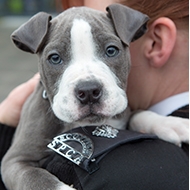
Pledges include eliminating the low-welfare puppy and kitten trade.
The Scottish SPCA (SSPCA) has unveiled an ambitious 10-year strategy for animal welfare, with a commitment to reduce levels of abuse and eradicate the cruel puppy and kitten trade.
The strategy, entitled For All Animals, also contains a pledge to create a network of more than 250,000 Youth Ambassasors and to ensure all farmed animals in Scotland are raised to the charity's own high welfare standards.
The SSPCA aims to grow its net income by 20 per cent over the next decade and become a Net Zero organisation. It said it would use the increased revenue to develop new and exisiting facilities where the need is greatest and enhance staff and volunteer development.
Scottish SPCA chief executive, Kirsteen Campbell, said: “Demand for our services is going to continue to grow and grow. That’s why many of the ambitions we have set out intend to get downstream of the main drivers of animal welfare issues and tackle them at their source.
“We are at a critical juncture for animal welfare in Scotland, where pets, wild and farmed animals face increasingly complex challenges. These can’t be solved by any individual or agency and a key part of For All Animals is creating and building the right partnerships."
She continued: “Our vision for animal welfare in Scotland is one where it is the best place in the world for an animal to be. It is a country where abuse is in retreat, where profiteering from animals is a thing of the past and where people everywhere treat animals with respect and kindness.
Scottish SPCA board chair, Fiona MacLeod, added: “Prevention is the P in SSPCA, and that will always be our ultimate aim. If an animal never needs our help that means their welfare has never been at risk or compromised. That is why this vision sets out what we think is required to create the circumstances which maximise the chances of every individual animal’s welfare requirements being met.”
“We will continue to resolutely support the animals who do need our help. Therefore, we are committed to becoming a more sustainable and resilient charity in terms of generating more net income, improving our environmental credentials and offering a first-class experience to not only the animals we care for but the people who so generously support and work with us.”
Image (C) Scottish SPCA



 The latest
The latest